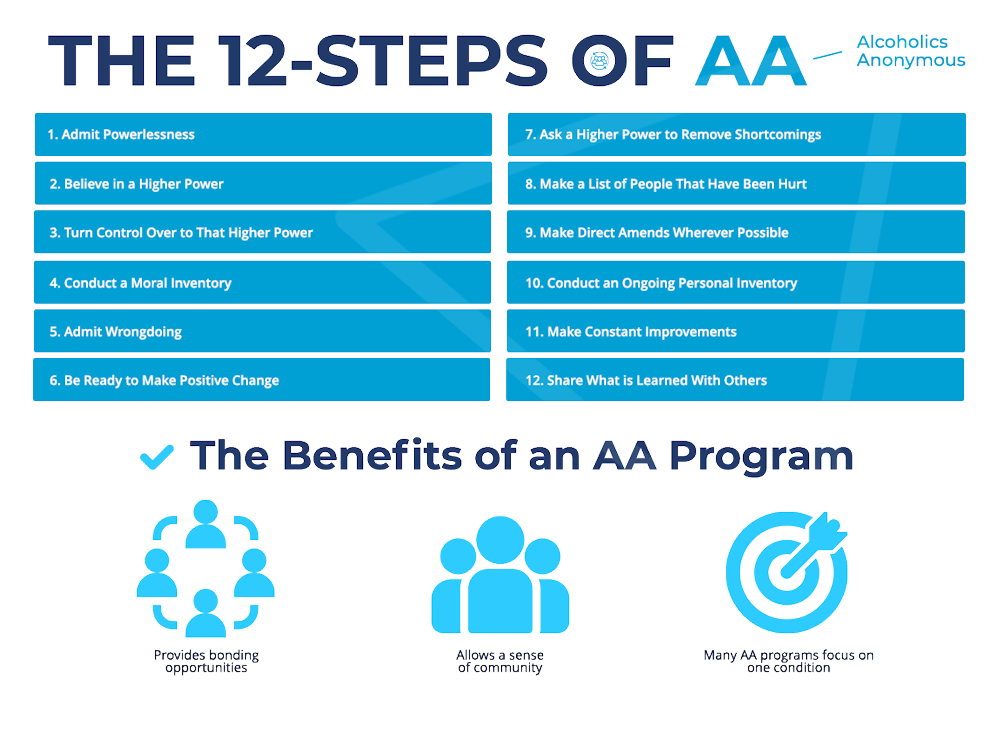Alcoholics Anonymous, also known as AA, is a free and effective resource for people whose lives have become unmanageable due to the effects of alcoholism. We know that intelligence, early successes, and the desire to quit are not enough to cause an alcoholic to stop drinking. For people who are willing to really put in the effort, Alcoholics Anonymous meetings provide the missing piece of the puzzle. Read on to learn more about the 12 steps recovery program and our alcohol addiction treatment programs.
The 12 Steps of Alcoholics Anonymous
The history of Alcoholics Anonymous (AA) can be traced back to the early 1900s. AA was founded in 1935 by two men, Bill Wilson and Dr. Bob Smith, who were both struggling with alcoholism. They developed a 12-step program to help people recover from alcoholism, which is still used today. AA has since grown into a worldwide organization with millions of members. The 12 steps guide people to overcome addiction and serve as a powerful recovery tool in life after rehab as well.
 Here are the famous 12 steps that originated with AA:
Here are the famous 12 steps that originated with AA:
1. Admit Powerlessness
Step 1 of AA is about admitting that individuals struggling with addiction just don’t have control over their lives. This is a difficult thing to do for many people. However, from chaos can come recovery.
2. Believe in a Higher Power
Step 2 in AA focuses on the belief that someone or something greater than ourselves exists in the universe. It can be spiritual rather than religious. Many programs that use a 12-step method don’t utilize any religious aspect. However, others do.
3. Turn Control Over to That Higher Power
Next, in step 3 of AA, individuals need to put control of their lives in the hands of a higher power. This means letting go of trying to know and manage everything.
4. Conduct a Moral Inventory
Step 4 of AA requires you to take a good, hard look at yourself and evaluate what you find within. You may have more to repair than just your addiction.
5. Admit Wrongdoing
The 12 steps of AA hinge on being able to admit fault. Step 5 is important because it highlights personal responsibility. Many people suffering from addiction try hard to avoid admitting they have a problem. Until they do, recovery becomes an unreachable goal.
6. Be Ready to Make Positive Change
Next, it’s time to prepare for the new and positive changes to come. Step 6 of AA is to ask your higher power to remove your defects. This means you take time for self-reflection and consider what’s required to make a real change.
7. Ask a Higher Power to Remove Shortcomings
Whether through prayer or meditation, step 7 of the 12 step program is all about trying to remove flaws and change negative behaviors. Often, these are the exact behaviors and actions that led to addiction in the first place.
8. Make a List of People That Have Been Hurt
This can be a challenging step. Step 8 of AA requires you to think back to your past and identify anyone you could have hurt. Addiction can impact many people, including those you care most about. Just because you’ve recovered doesn’t mean the hurt feelings of others instantly go away.
9. Make Direct Amends Wherever Possible
Next, in step 9 of AA, it’s time to apologize for the mistakes in your past. That means seeking out the people you have hurt and making amends, as long as it will be of benefit to them. There is much to be done in order to repair strained or broken relationships. It is your job to make that happen.
10. Conduct an Ongoing Personal Inventory
Step 10 of aa is a critical step for individuals. It is not just about admitting wrongdoing in the past, but admitting that you make mistakes all the time. Whenever you act or behave incorrectly, take the time to note it, apologize when necessary, and move on.
11. Make Constant Improvements
For religious or spiritual people, step 11 is about an ongoing connection with a higher power. For others, it can mean acknowledging that recovery doesn’t happen instantly. It takes continuous effort and care to move toward a complete recovery that lasts for a lifetime.
12. Share What is Learned With Others
The 12th step of aa is sharing the experiences of recovery with others. Overcoming a drug and alcohol addiction is challenging, but paying it forward can help the next person achieve recovery. This can be done in alcohol rehab, 12-Step meetings, or mentorship programs.
Feeling Lost? Find a Portland AA Meeting
 The 12 Steps of AA are only one element of substance use treatment and recovery. At Crestview Recovery in Portland, Oregon, they are part of a comprehensive approach to sobriety. We use the 12 steps of AA to treat a variety of addictions, including:
The 12 Steps of AA are only one element of substance use treatment and recovery. At Crestview Recovery in Portland, Oregon, they are part of a comprehensive approach to sobriety. We use the 12 steps of AA to treat a variety of addictions, including:
- Alcohol addiction rehab
- Cocaine addiction rehab
- Heroin addiction rehab
- Benzo addiction rehab
- Adderall addiction rehab
Contact us via our form or call Crestview Recovery at 866.262.0531 to learn more about our 12-step-informed Portland addiction treatment programs. There is tremendous healing power in groups of people who have experienced similar setbacks and are committed to helping others. If you feel like you are out of options, the Alcoholics Anonymous program has been saving lives for almost a century.
































